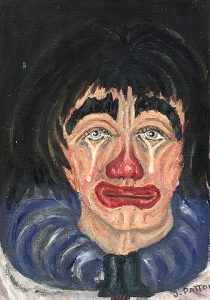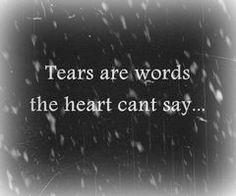This is a revision of the Jan. 1, 2015 article. It’s one of my most popular posts, so I figured I’d post it again, with a few changes.
Do narcissists cry? Sure, they do. Of course they do. And the histrionic, somatic types will cry conspicuously and loudly and convulsively and make sure everyone notices. Think of Joan Crawford’s over the top histrionics in he movie Mommie Dearest. The attention they get from this show of dramatics (which you cannot ignore) elicits lots of narcissistic supply for them and gets them the sympathy they crave. Remember, positive attention isn’t necessary to serve as supply to a narcissist. Any sort of attention–even disgust and anger–will do.
Self-serving crying and fake empathy.
Narcissists cry for themselves, never for you. They *might*cry when they see a sad movie, if they experience themselves through that character. Movies are a safe way to shed tears, even for those who don’t cry easily (and that includes non-narcs too). But narcissists aren’t really crying for the characters in the movie. They are really crying for themselves.
Some narcissists who are good actors can pretend to cry for others–these are dangerous narcissists able to feign empathy but show their true colors after they’ve charmed you and duped you into thinking they’re the nicest, most sympathetic person in the world. But it’s all fake. Those “empathetic tears” are crocodile tears. A narcissist can never cry for anyone but themselves.
Narcissists are just big babies.
Kim Saeed, a writer who has an excellent and extremely popular blog here at WordPress about narcissistic abuse, wrote an insightful article about what makes a narcissist cry (basically, self pity and attention getting). It’s a good read. Narcissists cry the way an infant cries–to have their immediate needs met. Whether they admit it or not, they need a mother–and most likely never got adequate mothering, so they’re still trying to get it. Like an infant, they are incapable of separating themselves from others and can feel no empathy for anyone else.

Here’s who your narcissist really is.
While some narcissists take pride in their appearance, professional accomplishments, athletic prowess, or outstanding intelligence, there are some narcissists (the covert type) who take a perverse pride in being as pitiful and pathetic as it’s possible to be. These are what I call “needy narcissists” (Kim Saeed refers to them as “extreme narcissists”). Many of our mothers (not mine–my mother was overt and aggressive) fall into this category. They guilt-trip you and constantly whine about how badly you’ve treated them. They remind you of all the wonderful things they’ve done for you. They are emotional, financial and spiritual vampires who will suck you dry if given half a chance. They tend to attract empaths and HSPs and codependent types of people who are willing to give them the pity and sympathy they crave. And they use tears to elicit those things. Tears are powerful and contagious and get babies what they want–why not narcissists? Hey, if it works, use it.
Can a narcissist ever cry non-self serving tears?
A narcissist crying for reasons other than self-serving ones is rare. But if one ever enters therapy or gets to a point where they recognize their own narcissism and is able to grieve for their lost true self, it’s possible. Don’t get your hopes up though. That being said, I read an article by Sam Vaknin about the way he cries in his dreams, which I thought was pretty interesting. If something like this can happen, maybe it could be used as a catalyst to healing. Maybe. (Sam is not cured of NPD and probably never will be. It’s his livelihood).
Dreaming and “lucid” dreaming: a possible key to healing?
Dreams open us up to the subconscious mind, so remembering dreams is useful in therapy. For a narcissist, dreams have the potential of tapping into the atrophied and depressed true self–the self that dissociated and went into hiding during early childhood to protect itself from abuse by caregivers. Sam Vaknin writes about this phenomenon in this journal entry, in which he describes two nightmares that briefly brought him in contact with his true lost self, at least until he woke up.
He writes:
I dream of my childhood. And in my dreams we are again one big unhappy family. I sob in my dreams, I never do when I am awake. When I am awake, I am dry, I am hollow, mechanically bent upon the maximization of Narcissistic Supply. When asleep, I am sad. The all-pervasive, engulfing melancholy of somnolence. I wake up sinking, converging on a black hole of screams and pain. I withdraw in horror. I don’t want to go there. I cannot go there.
One’s narcissism stands in direct relation to the seething abyss and the devouring vacuum that one harbors in one’s True Self.
I know it’s there . I catch glimpses of it when I am tired, when I hear music, when reminded of an old friend, a scene, a sight, a smell. I know it is awake when I am asleep. I know that it subsists of pain – diffuse and inescapable. I know my sadness. I have lived with it and I have encountered it full force.
Perhaps I choose narcissism, as I have been “accused”. And if I do, it is a rational choice of self-preservation and survival. The paradox is that being a self-loathing narcissist may be the only act of self-love I have ever committed.

Crying of the Stone Angel by Eternal Dream Art at Deviantart.com
Can a narcissist’s true self ever see the light of day?
The true self is there in hiding, sometimes peeking out in dreams. A narcissist without insight (which is almost all of them) would not be able to write the post quoted above. Even if they were aware of having such a vulnerable inner self, they would never admit it. They’re so walled off from their true feelings they can’t access it even in dreams. Instead, they shore up a fake self that takes the place of the true one–but it’s not sustainable and will fall apart without a constant source of narcissistic supply that keeps it inflated like a balloon. The constant inflation keeps their false self alive and as long as it’s there, they never have to face the black emptiness inside where the atrophied child-self exists. If they fall into such a depression, they may go insane. Suicide is not unheard of.
Sadness and tears that could arise from being able to encounter one’s true self, even if only briefly in a dream, could be the key to healing. If only anyone really could figure out how to harness this and keep it accessible long enough for the narcissist to start doing some difficult internal work before they slap that mask back on. Harnessing any brief moments of emotional nakedness is like trying to hold onto a dream while awake–most of the time, it dissolves and fragments like soap bubbles before being swept away in the the river of day to day reality. It’s still there, buried in the narcissist’s unconscious the way a clam buries itself deep in the wet sand near the shore after the waves recede. But in all likelihood, the narcissist will die a narcissist, and no one (including themselves) will ever know what could have been. I think most of them choose to remain living in the darkness because it’s a whole lot “safer.” Maybe “lucid dreaming” (a skill that can be learned) could be one way to capture the true self when it emerges in a dream, and keep it there long enough to work with.
Most people don’t believe narcissists can be cured (and in most cases, they can’t be and are perfectly fine with being the way they are). That being said, I like to remain optimistic. I can’t believe there are people walking on this earth who have completely lost their souls. Unless a person has consciously chosen evil and has become sociopathic, I don’t think most narcissists are that far gone. The challenge is catching them when their guard is down, which is almost never. I don’t recommend you try doing this yourself. Leave it to the professionals or to God. You cannot fix a narcissist. All you can really do is stop giving them supply, so stay (or go) No Contact.











